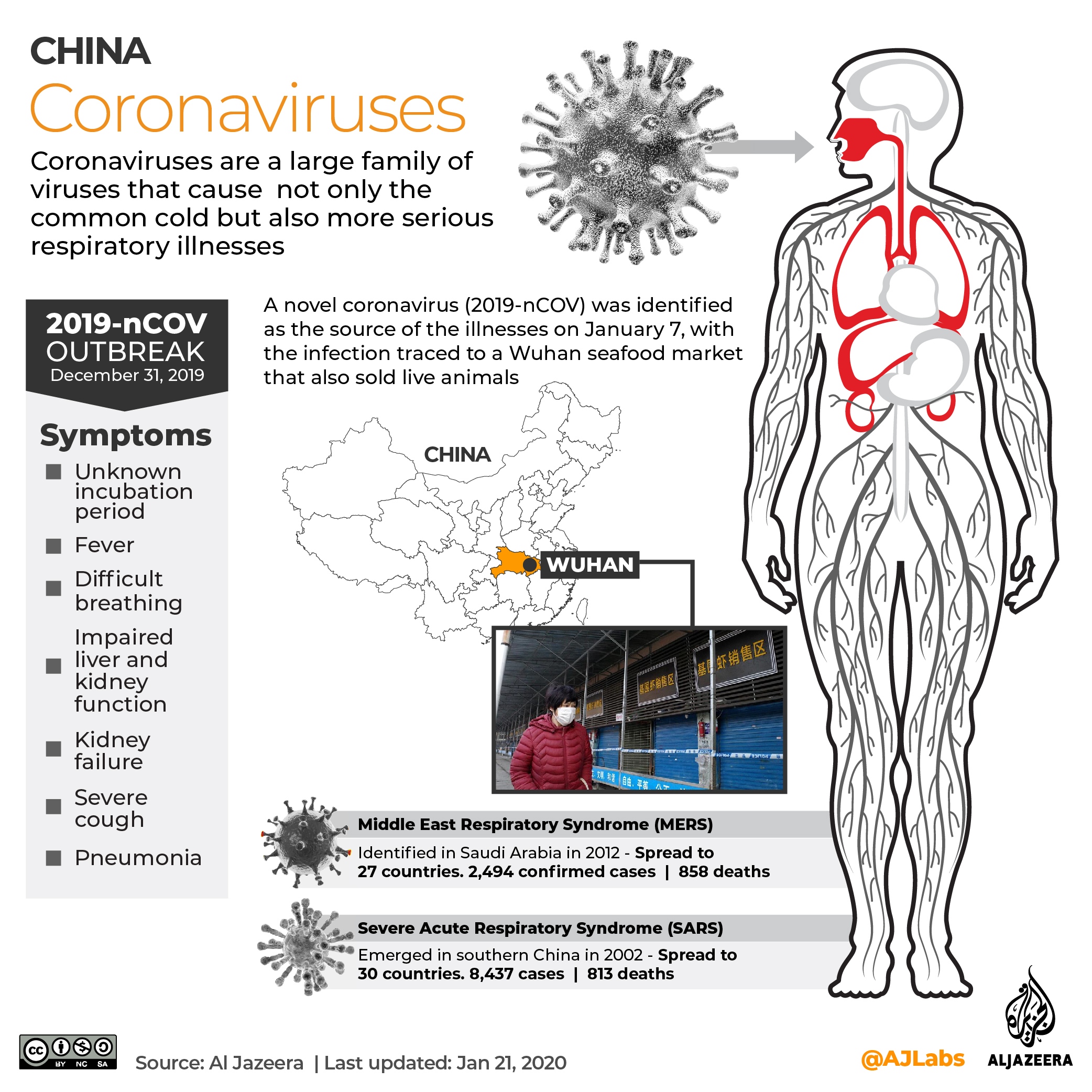Here is what you need to know:
What is coronavirus?
According to the World Health Organization, coronaviruses are a family of viruses that cause illness ranging from the common cold to more severe diseases such as Middle East respiratory syndrome (MERS) and severe acute respiratory syndrome (SARS).
These viruses are transmitted between animals and people. SARS, for instance, was believed to have been transmitted from civet cats to humans while MERS travelled from a type of camel to humans.
Several known coronaviruses are circulating in animals that have not yet infected humans.
The name coronavirus comes from the Latin word corona, meaning crown or halo. Under an electron microscope, the image of the virus is reminiscent of a solar corona.
A novel coronavirus, identified by Chinese authorities on January 7 and currently named 2019-nCoV, is a new strain that had not been previously identified in humans.
Little is known about it, although human-to-human transmission has been confirmed.
What are the symptoms?
According to the WHO, signs of infection include respiratory symptoms, fever, cough, shortness of breath and breathing difficulties.
In more severe cases, it can lead to pneumonia, severe acute respiratory syndrome, kidney failure and even death.
The incubation period of the coronavirus remains unknown. Some sources say it could be between 10 to 14 days.
How deadly is it?
Some experts say it may not be as deadly as other types of coronavirus such as SARS, which killed nearly 800 people worldwide during a 2002-2003 outbreak that also originated from China.
MERS, which did not spread as widely, was more deadly, killing a third of those it infected.
Where have cases been reported?
Most cases have been reported in China.
As of January 24, Chinese officials said at least 26 people have died, all in Hubei Province, of which Wuhan is the capital. That is also where most of the 830 reported cases are.
Other countries have reported far fewer cases, in the examples below less than 10.
These include: Thailand; Singapore; Vietnam; Japan; the United States; South Korea; France and Nepal.
All the cases involve people who had either come from Wuhan or been there recently.
What is being done to stop it spreading?
There is no vaccine for the new virus.
Chinese authorities effectively sealed off Wuhan on Thursday, suspending flights and trains out of the city and telling residents they could not leave without a special reason, state media said.
The move was meant to "resolutely contain the momentum of the epidemic spreading" and protect lives, the central city's special command centre against the virus said, according to state broadcaster CCTV.
At least 12 other Chinese cities were added to the transport ban on Friday, affecting more than 20 million people.
Chinese authorities have also stepped up monitoring and disinfection efforts in advance of the Lunar New Year break.
Airport authorities from Asia and the Middle East to Europe and the US are also screening passengers.
Where did the virus originate?
Chinese health authorities are still trying to determine the origin of the virus, which they say came from a seafood market in Wuhan where wildlife was also traded illegally.
The WHO also says an animal source appears most likely to be the primary source of the outbreak.
Snakes - including the Chinese krait and the cobra - may be the source of the newly discovered virus, according to Chinese scientists.
There is evidence of respiratory transmission of the virus from patient to patient and Chinese authorities have said 15 medical staff in the country have been infected.
Experts worry when health workers get sick during new outbreaks because this can suggest the disease is becoming more transmissible and because spread in hospitals can often amplify the epidemic.
Is this a global emergency?
The outbreak does not yet constitute a global emergency, the WHO has said, urging China to keep its lockdown "short".
WHO chief Tedros Adhanom Ghebreyesus told reporters that the decision to hold off on issuing the declaration used for the gravest epidemics should not be taken as a sign that the body does not think the situation is serious.
"This is an emergency in China, but it has not yet become a global health emergency," he told reporters. 
SOURCE: AL JAZEERA AND NEWS AGENCIES
A study that has been performed by researchers from China, has found that humans can be protected from being reinfected by novel Covid-19. According to the reports by Daily Nation, the study that was performed basing on monkeys found that they can be protected from the virus for over 28 days later without being infected again.
After some few days, they showed a short increase in body temperature but were never re-infected by the virus. According to the researchers, the viral load took around 3 days before reaching its peak after infection.


